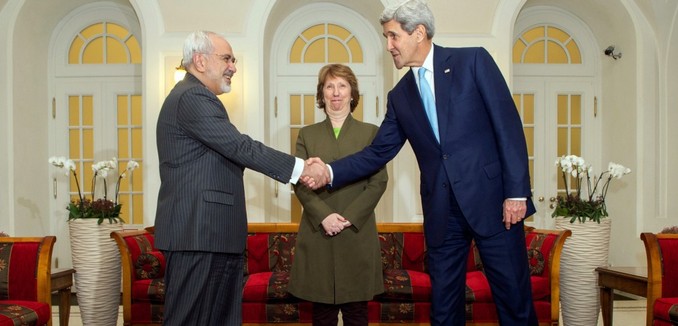David Daoud critiques the Obama administration’s recent diplomacy with Iran in Replacement Theory: The Administration’s Crazy New Middle East Illusion, which was published in the December 2014 issue of The Tower Magazine. Daoud outlines possible rationales and consequences of the administration’s rapprochement with Iran.
Many interpret America’s softening stance toward Iran as an attempt to make Tehran more amenable to a deal on its nuclear program. But the Obama administration’s new approach to Iran doesn’t end with the nuclear issue, and assuming it does is to miss the true danger of it all. This White House views the nuclear deal currently being negotiated as only a first step toward a general détente and broader cooperation between the two countries. The perception permeating the Situation Room is that filling the power vacuum created by recent Middle Eastern upheavals with Iranian forces—especially its Revolutionary Guard Corps (IRGC) and its proxy Hezbollah—will help stabilize the ungovernable spaces of the region in Iraq, Syria and beyond. Getting the nuclear deal out of the way is therefore essential to progress on positioning Tehran as “a force for stability” in the region, as the President has described it.
For the Islamic revolutionaries and clerical dictators running the country, this new approach is a welcome change from decades of American efforts to sideline Iran. But Tehran is receptive to Washington’s changes for entirely different reasons. Seizing on what it sees as American weakness under this administration, Tehran believes it can break free of the diplomatic and economic sanctions that have crippled its economy, and freeze Western efforts to stall its regional ambitions. A nuclear deal in Iran’s favor may be with in its grasp, Tehran believes. And they may not even need to make such an agreement, if simply by negotiating with the West they can resurrect their economy and stall any U.S. action against their takeover of Syria, Iraq, and Yemen, removing further obstacles to their regional hegemony.
And it is here, in Iran’s very different view of a possible rapprochement with the United States, that the real danger to regional and American interests lies. Contrary to the expectations of many U.S. policymakers, giving Iran free rein in the Middle East would not be a major diplomatic victory, but a strategic nightmare. Replacing the putative caliphate of the Islamic State with the brutal Imamate of the Islamic Republic, the IRGC, Hezbollah and the rest of Iran’s regional proxies, would be a strategic and moral catastrophe.
The agreement to extend nuclear negotiations with Iran in November was not viewed as a diplomatic success by Iran as much as it was viewed as a victory over the United States and the West. Iran’s nuclear negotiator, Mohammad Javad Zarif declared that the extension enshrined an non-existent right of Iran to enrich uranium and called the extension a “defeat” of “Iranophobic attempts to securitize the Iranian peaceful nuclear program.” Supreme Leader Ayatollah Ali Khamenei was more explicit, claiming “In the nuclear issue, America and colonial European countries got together and did their best to bring the Islamic Republic to its knees, but they could not do so — and they will not be able to do so.” This defiant reaction to the extension of negotiations by Iran’s leadership calls into question the premise of the Obama administration that the nuclear negotiations are “a first step toward a general détente and broader cooperation” with Iran.
[Photo: U.S. Department of State / Flickr ]




